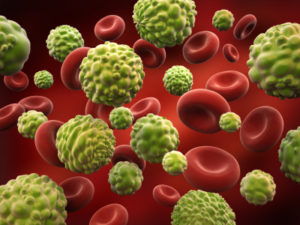What is blood cancer?
Blood cancer represents a large group of different malignancies. This group includes cancers of the bone marrow, blood, and lymphatic system, which includes lymph nodes, lymphatic vessels, tonsils, thymus, spleen, and digestive tract lymphoid tissue. Leukemia and myeloma, which start in the bone marrow, and lymphoma, which starts in the lymphatic system, are the most common types of blood cancer. What causes these cancers is not known.
As leukemia and myeloma grow within the bone marrow, they can interfere with the bone marrow’s ability to produce normal blood cells, including white blood cells, red blood cells, and platelets. This can cause frequent infections, anemia, and easy bruising. Lymphomas, which most typically appear as enlargement of the lymph nodes, can also interfere with the body’s ability to fight infections. Additionally, myelomas generate a substance that weakens bones, and produce abnormal proteins that can cause symptoms in other parts of the body.
What are the symptoms of blood cancer?
Blood cancer can produce a variety of symptoms, or none at all.
Common symptoms of blood cancer
Symptoms of blood cancer can include:
- Abdominal pain, especially in the upper abdomen
- Bone fractures (spontaneous or resulting from minimal trauma)
- Bone or joint pain
- Easy bleeding or bruising
- Enlarged liver and glands, such as the spleen and lymph nodes
- Fatigue
- Fever and chills
- Frequent infections
- Frequent urination
- Nausea, which may be described as feelings of wooziness, queasiness, retching, sea-sickness, car-sickness or upset stomach
- Night sweats
- Unexplained weight loss
What causes blood cancer?
Although the specific cause of blood cancer is not known, a number of factors are associated with its development. Many blood cancers are more common among older adults. Some tend to run in families. Certain infections also appear to increase the risk of some blood cancers, as does a weakened immune system.
What are the risk factors for blood cancer?
A number of factors increase the risk of developing blood cancer. Not all people with risk factors will get blood cancer. Risk factors for blood cancer include:
- Advanced age
- Certain types of infections
- Compromised immune system due to such conditions as HIV/AIDS, taking corticosteroids, or organ transplant
- Exposure to certain chemicals
- Exposure to radiation or certain types of chemotherapy
- Family history of blood cancer
- HIV/AIDS
- Solid organ transplant recipient
- Personal history of certain blood disorders
- Personal history of certain genetic disorders (Down syndrome)
- Smoking
How is blood cancer treated?
Goal of cancer treatment
The goal of blood cancer treatment is to permanently cure the cancer or to bring about a complete remission of the disease. Remission means that there is no longer any sign of the disease in the body, although it may recur or relapse later.
Some blood cancers grow slowly enough that delaying treatment may be an option. If the decision to delay treatment is made, close follow-up, called watchful waiting, is needed so that significant progression can be identified and treatments can be started when needed.
Common treatments for blood cancer
Several therapies are available to treat blood cancers including:
- Biological therapy to attack cancer cells
- Chemotherapy to attack cancer cells
- Participation in a clinical trial testing promising new treatments for blood cancers
- Radiation therapy to attack cancer cells
- Stem cell transplant to provide healthy stem cells that can make healthy blood cells
- Targeted therapy to attack specific cancer cells or signaling proteins
- Watchful waiting to identify when to start treatment
Other treatments for blood cancer
Other therapies may be added to help with your general state of health and any complications of the cancer or its treatment including:
- Anti-nausea medications if needed
- Antibiotics and other medications to reduce the likelihood of getting infections
- Blood transfusions to temporarily replace blood components (such as red blood cells or platelets)
- Dental care to manage oral symptoms of leukemia or chemotherapy
- Dietary counseling to help people with cancer maintain their strength and nutritional status
- Pain medications if needed to increase comfort
- Surgery to remove an enlarged spleen or to treat bone fractures
- Vaccinations to prevent diseases like the flu and pneumonia
Complementary treatments
Some complementary treatments may help some people to better deal with blood cancer and its treatments. These treatments, sometimes referred to as alternative therapies, are used in conjunction with traditional medical treatments. Complementary treatments are not meant to substitute for traditional medical care. Be sure to notify your doctor if you are consuming nutritional supplements or homeopathic (nonprescription) remedies as they may interact with the prescribed medical therapy.


who is the best doctor for blood cancer in Chennai?
which is the best hospital for blood cancer in chennai?